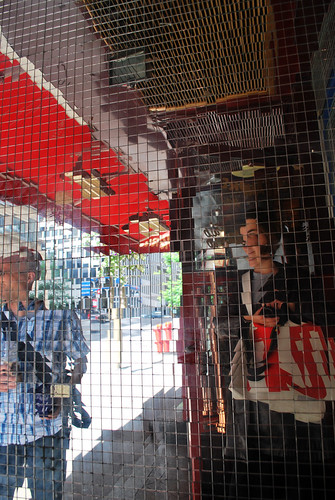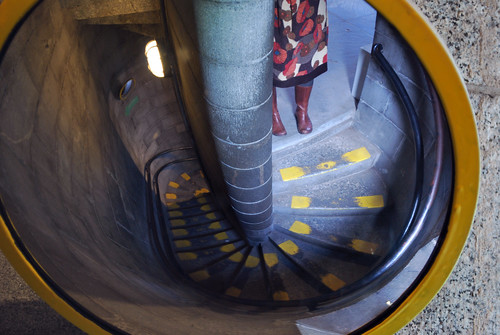
{Photos by rocketlass.}
For the past week or so I’ve been really enjoying a collection of Borges interviews, Seven Conversations with Jorge Luis Borges, which was published in Spanish in 1972, in English in 1982, and was republished this year by Paul Dry Books. The interviews are conducted by Argentine writer Fernando Sorrentino, and because of that, and their intended audience of Spanish-speaking readers, they remind me more than I expected of the recent collection of interviews with Roberto Bolano: the conversation between Borges and Sorrentino is peppered with the names of Spanish-language authors, from the familiar (Adolfo Bioy Casares) to the familiar but unread (H. Bustos Domecq) to the completely unfamiliar (Jose Marmol and many, many others). Because the names emerge in the course of ongoing talks about favorites and influences and schools, it’s less a case of name-dropping and more a pleasant reminder of the largely unknown wealth of non-English literatures--and of how Borges always thought of himself as a reader at least as much as he thought of himself as a writer. At a minimum, he's convinced me to give Jose Maria de Eca de Queiros a try sometime soon.
I’ll share one passage that jumped out at me tonight, an act of . . . well, the only word I can come up with, though it sounds too strong, is bravery, on the part of the interviewer, telling Borges what he likes and doesn’t like in his writing, and getting an interesting answer:
F. S. Reader usually believe, unjustly perhaps, that they can demand a particular kind of behavior from a writer they admire. I, who have been dazzled by the stories in Ficciones and El Aleph, take the liberty of criticizing you for having given up, in the stories of El informe de Brodie, those complex plots. How would you answer me?I love this exchange. Sorrentino is honest and straightforward, at the risk of seeming like a jerk, and Borges takes up his question seriously. And after explaining that he’s tired of, among other things, games with time, he turns to pleading that time itself may be at fault--an answer that is simultaneously sensible, convincing, and, with that final little time-indicting twist, suitably Borgesian.
J. L. B. My answer to you is that I’ve done it deliberately, because since I’ve been told there are other people who are writing that type of literature, and no doubt they’re doing it better than I, I’ve attempted something different. But it’s possible that this is my conscious motive and, for that very reason, not too important. Instead, I believe there is something that has led me to write stories of another type: being tired of mirrors, of labyrinths of people who are other people, of games with time. Why not suppose that being tired of all that, I want to write stories somewhat the way others do?
F. S. Of course, I understand that. But, speaking for myself, I wouldn’t think of reading El Informe de Brodie again, yet I read and re-read El Aleph (I know it almost by heart).
J. L. B. That might be due to the fact that when I wrote El Aleph, the writing was carried out in a kind of literary plenitude. On the other hand, it could be that I’m now in a state of decline and my current works reflect a sort of decadence in me. It would be perfectly natural because it’s biologically understandable. In August, I’ll be seventy-two years old, and it’s only logical for what I’m writing now to be inferior to what I wrote earlier. I think this biological explanation is a pretty likely one.

You probably already know this, but just in case: H. Bustos Domecq is the pseudonym of Borges and Bioy Casares writing in collaboration.
ReplyDeleteSince you read these interviews in English translation, you really should have at least mentioned the name of the translator.
ReplyDelete